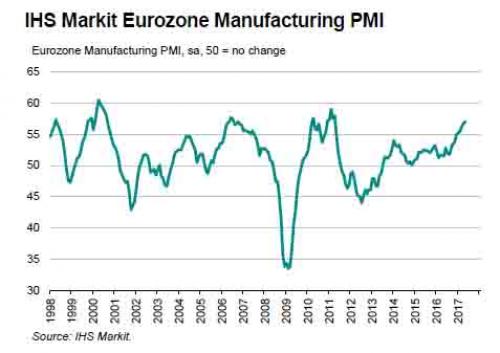S&P futures are little changed this morning, while Asian shares rise and European stocks (+0.5%) are poised to snap a five-day losing streak amid a broad-based rally. The pound declined as better-than-expected manufacturing data failed to offset political risk before the impending election, while crude oil gained.
Across Europe, all 19 industry groups on the Stoxx Europe 600 Index advanced (the index itself was up 0.5% in early trading), helped by media companies amid strength in the auto sector after Barclays said fears for the used car market have been overdone. Bank shares underperformed rising European stocks, after JPM and BofA warned on Wednesday that low market volatility would crimp trading revenue. Energy shares also rose as oil bounced in the wake of data pointing to a bigger-than-expected drop in U.S. stockpiles. The euro fell after two days of gains while the dollar edged higher. European manufacturing activity grew at its fastest rate in more than six years in May, according to the final eurozone PMI index.
The final Markit Eurozone Manufacturing PMI rose to a 73-month high of 57.0 in May, up from 56.7 in April and unchanged from the earlier flash estimate. The PMI has signalled expansion in each of the past 47 months.
- Germany 59.5 (flash: 59.4) 73-month high
- Austria 58.0 2-month low
- Netherlands 57.6 4-month low
- Ireland 55.9 22-month high
- Spain 55.4 4-month high
- Italy 55.1 3-month low
- France 53.8 (flash: 54.0) 2-month low
- Greece 49.6 9-month high

Commenting on the final Manufacturing PMI data, Chris Williamson, Chief Business Economist at IHS Markit said: “The eurozone upturn is developing deeper roots as factories enjoy a spring growth spurt. Demand for goods is growing at the steepest rate for six years, encouraging manufacturers to step up production and take on extra staff at a rate not previously seen in the two-decade history of the PMI survey.“
Asian shares, as measured by MSCI’s main index of Asia-Pacific shares, excluding Japan rose 0.1% to 498.39, though gains were limited by data showing Chinese factory activity contracted in May for the first time in 11 months. The MSCI Asia Pacific Index rose 0.3 percent, after capping its fifth straight monthly gain for the longest winning streak since 2013. Japan’s Topix rallied 1.1 percent as capital spending topped estimates. The Shanghai Composite fell 0.5% after the a private survey of the manufacturing sector. The findings contrasted with official data on Wednesday which suggested growth remained steady. The poor Chinese data hit the Australian dollar, often seen as a proxy for the health of the world’s second-biggest economy.
As reported earlier, following ongoing fireworks, China’s onshore yuan shrugged off poor PMI data and headed for the biggest four-day advance in almost 12 years, rising to a seven month high amid speculation policy makers are trying to discourage bets against the currency. The Yuan strengthened beyond 6.8 per dollar for the first time since Nov. 11 after the central bank pushed its reference rate, around which the spot rate can fluctuate, 0.8 percent higher in the second-largest single-day appreciation of the currency since it was de-pegged from the dollar in 2005.
“The PBOC has let the yuan bulls loose in the China shop,” said Stephen Innes, senior trader at OANDA in Australia, referring to the People’s Bank of China.
Britain’s pound, on a rollercoaster ride this week as polls have sent conflicting signals about the outcome of next week’s election, fell 0.1 percent to $1.2874 after another poll showed the Prime Minister Theresa May’s Conservatives just 3 percentage points ahead of the Labour opposition. There was little reaction to Britain’s manufacturing PMI beating forecasts. “This data point is clearly a positive for the UK economy however GBP traders are putting macro releases on the back burner at present, with the twists and turns in the race for upcoming election having a greater impact on the market of late,” David Cheetham, markets analyst at broker XTB, said.
In commodities, Brent rose off Wednesday’s three-week lows in anticipation of the United States quitting the Paris accord. President Donald Trump is expected to announce his decision later on Thursday. West Texas Intermediate crude oil advanced 1.3 percent to $48.96 a barrel, rebounding from a 2.7 percent drop in the previous session.
“If he actually withdraws the U.S from the climate accord, this would signal his intention to further roll-back emission regulations that would favor the use and demand of fossil fuels, thus giving a much needed boost to oil prices,” Jonathan Chan, investment analyst at Phillip Futures in Singapore, told Reuters.
Gold dropped 0.2 percent to $1,266.99 an ounce, giving back some of Wednesday’s 0.5 percent gain.
There was little acticity in rates, where the yield on 10-year Treasuries rose one basis point to 2.21 percent, after falling a similar amount on Wednesday.

